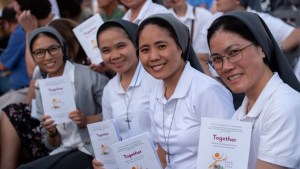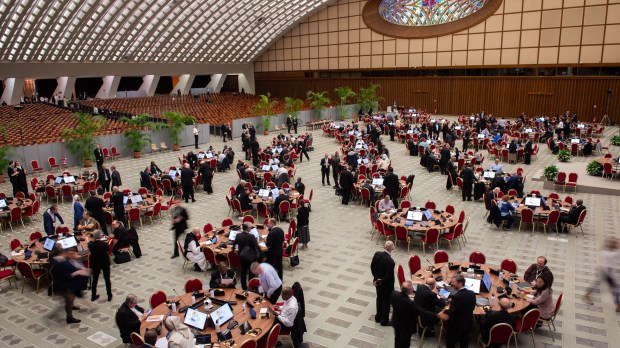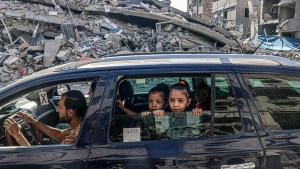“What am I doing here at the Synod?” At the briefing on October 12, 2023, Focolare president Margaret Karam, an Arab Catholic born in Israel, admitted asking herself this question as she follows the war ravaging her country “with a torn heart.” But for her, the “lifestyle of the Church” that she is experiencing at the Synod on the future of the Church can enable Catholics to better promote dialogue and peace in the world.
Bridges of peace
“It’s not easy to listen to others and understand them, to engage in dialogue and allow oneself to be challenged by others,” said the lay leader. “If what we are learning here in the Synod for a whole month, we manage to do among ourselves […] we can import it into many environments,” she said. She believes that this could help build “bridges of peace.”
Karam said that she has received many testimonies from people in the Holy Land and elsewhere committed to peace. She was particularly touched by messages from Israeli Jewish friends who, despite their pain, expressed “concern” for those living in Gaza. A Jewish friend told her that she had symbolically chosen to pray at the same time as the Muslims.
The Focolare president emphasized the number of organizations “that nobody talks about,” which are committed to peace in the Holy Land and around the world. “We only talk about hatred, division, and terrorism,” she said.
Prayer for the end of conflicts from around the world
Peace was a major theme of the day. In the morning, Iraqi Cardinal Raphaël Sako led a prayer during which he invited all Synod members to pray for peace in the world. He particularly mentioned the Holy Land, Lebanon, and Ukraine, but also his own country, Iraq.
The Cameroonian bishop of Bamenda, Andrew Nkea Fuanya, also participated in the midday briefing. He said that he had “learned from other continents” by listening to testimonies on the conflicts ravaging Ukraine and the Holy Land in particular.
Synodality in Africa
Bishop Nkea explained that he had intervened during the assemblies to affirm that “synodality is very welcome in Africa.” He explained that he could already see it at work in his own country, Cameroon. There, Christian communities live like those of the early days of the Church, i.e. as “families” in which it is important to “consult everyone” before making a decision.
Without going into detail, the secretary of the Commission for Information, Sheila Leocadia Pires, returned to some of the interventions that took place in Paul VI Hall. One of the central issues of the day was that of interreligious and intercultural dialogue, and the importance of strengthening dialogue with indigenous populations.
The declining interest of young people in the Church in the Western world, the need for religious leaders to promote peace, and the importance of fostering a “ministry of listening” in the Church were also raised.
Photos of dialogue
On X (formerly known as Twitter), the American priest James Martin, SJ, a Jesuit strongly committed to the inclusion of people from the LGBTQ community, posted a photo of himself and Cardinal Gerhard Müller, Prefect Emeritus of the Dicastery for the Doctrine of the Faith, who defends conservative positions on homosexuality and has been critical of the Synod. “I’m very happy that Cardinal Müller is with us at the Synod. Please keep us all in your prayers as we pray and dialogue together,” he said.
The day before, the Jesuit had published another photo, this time with Archbishop Péter Fülöp Kocsis, metropolitan archbishop of the Archdiocese of Hajdúdorog (Hungary) and head of the Hungarian Greek Catholic Church. “We agree on the foundations of faith, of course, but not so much on LGBTQ issues,” he had commented, explaining that he was grateful for the “honest conversation” he had with him.



